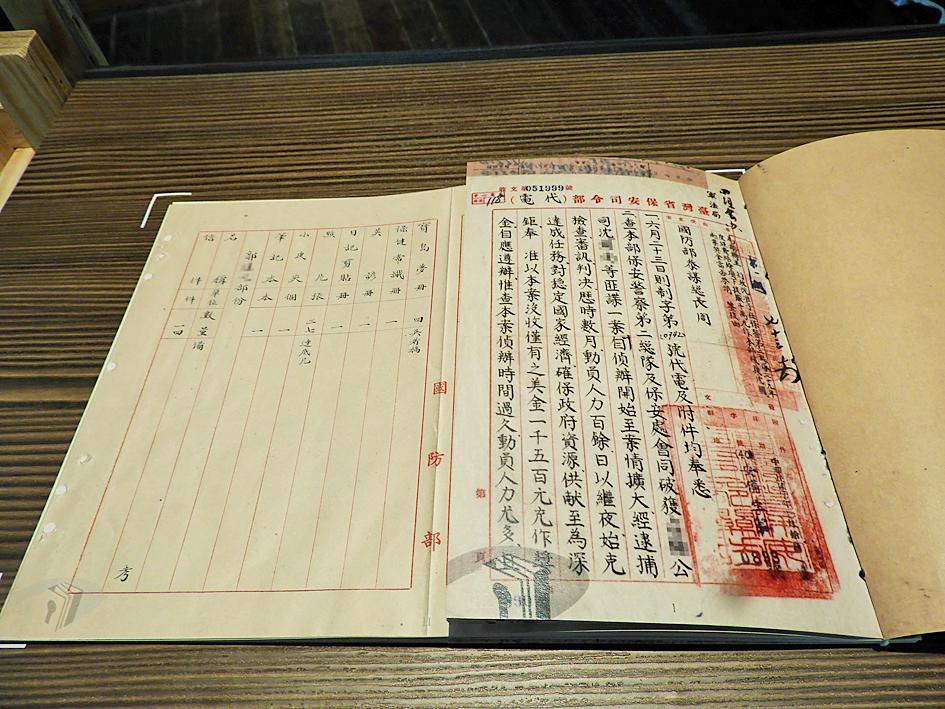The Transitional Justice Commission is drafting a bill that would return ill-gotten assets to the families of wealthy businesspeople and landowners whose assets were confiscated during the White Terror era, the commission said on Monday.
The properties of political prisoners, such as businessmen Huang Tien-liang (黃添樑) and Liu Chuan-ming (劉傳明), who were accused of helping the Chinese communists, accounted for 60 percent of assets confiscated by the then-Chinese Nationalist Party (KMT) government following the 228 Incident, it said.
A total of 177 people had their properties confiscated during the White Terror era, Formosan Political Prisoners’ Association honorary director-general Tsai Kuan-yu (蔡寬裕) said.

Photo: Chen Yu-fu, Taipei Times
Huang, former secretary-general of the Taiwan Federation of Commerce, was one of the biggest victims, and there was evidence that government agents had coveted his property, Tsai said.
The commission would submit a draft act this month, and would seek to compensate victims’ families either through the return of assets or monetary compensation, it said.
Confiscated assets were distributed by the KMT in four ways: They were added to the state treasury; given as rewards to those who filed reports incriminating others; given as rewards or expenditures to those who solved these cases; or — in the case of real-estate properties — used by government agencies or agents.
The commission looked at more than 500 cases of confiscated assets listed among records held by the Ministry of National Defense, including 300 that were only recently uncovered, it said.
The cases mainly involved people accused of breaching the Punishment of Rebellion Act (懲治叛亂條例), which has since been repealed, Tsai said, adding that some of the accused had no property that could be confiscated.
In 1949, Huang had gifted NT$3,000 to Taiwan Tribune cofounder Chen Chi-chang (陳其昌) to open a restaurant, but Chen instead lent the money to his colleague at the newspaper, Huang Pei-yi (黃培奕), Tsai said.
After Huang Pei-yi was tried as a communist spy, Huang Tien-liang was accused of aiding the communists.
There are still 188 real-estate properties confiscated during the White Terror era that remain in the government’s possession, Tsai said, adding that one of those is the now-abandoned Dingxing (鼎興) military barracks in Taipei’s Zhongshan District (中山).
The 3.2-hectare plot is one of the properties confiscated from Huang Tien-liang, he added.
Liu, another wealthy victim of political persecution during the White Terror era, was sentenced to 10 years in prison and had his various properties confiscated, after people he was associated with were accused of spreading communist propaganda.
In some of the cases victims had not even been given a trial before intelligence officials confiscated and occupied their property, Tsai said.
In his memoirs, former officer in the now-defunct Counterintelligence Bureau, Ku Cheng-wen (谷正文), said he had instructed officers arriving in Taiwan after fleeing China to take whatever properties they wanted as their own, Tsai said, adding that owners of property that officers wanted would be then arrested on fabricated charges.
Several examples of such cases remain to be further investigated, he said.

An apartment building in New Taipei City’s Sanchong District (三重) collapsed last night after a nearby construction project earlier in the day allegedly caused it to tilt. Shortly after work began at 9am on an ongoing excavation of a construction site on Liuzhang Street (六張街), two neighboring apartment buildings tilted and cracked, leading to exterior tiles peeling off, city officials said. The fire department then dispatched personnel to help evacuate 22 residents from nine households. After the incident, the city government first filled the building at No. 190, which appeared to be more badly affected, with water to stabilize the

DEEPER REVIEW: After receiving 19 hospital reports of suspected food poisoning, the Taipei Department of Health applied for an epidemiological investigation A buffet restaurant in Taipei’s Xinyi District (信義) is to be fined NT$3 million (US$91,233) after it remained opened despite an order to suspend operations following reports that 32 people had been treated for suspected food poisoning, the Taipei Department of Health said yesterday. The health department said it on Tuesday received reports from hospitals of people who had suspected food poisoning symptoms, including nausea, vomiting, stomach pain and diarrhea, after they ate at an INPARADISE (饗饗) branch in Breeze Xinyi on Sunday and Monday. As more than six people who ate at the restaurant sought medical treatment, the department ordered the

Taiwan plans to cull as many as 120,000 invasive green iguanas this year to curb the species’ impact on local farmers, the Ministry of Agriculture said. Chiu Kuo-hao (邱國皓), a section chief in the ministry’s Forestry and Nature Conservation Agency, on Sunday said that green iguanas have been recorded across southern Taiwan and as far north as Taichung. Although there is no reliable data on the species’ total population in the country, it has been estimated to be about 200,000, he said. Chiu said about 70,000 iguanas were culled last year, including about 45,000 in Pingtung County, 12,000 in Tainan, 9,900 in

ALLEGED SABOTAGE: The damage inflicted by the vessel did not affect connection, as data were immediately rerouted to other cables, Chunghwa Telecom said Taiwan suspects that a Chinese-owned cargo vessel damaged an undersea cable near its northeastern coast on Friday, in an alleged act of sabotage that highlights the vulnerabilities of Taipei’s offshore communications infrastructure. The ship is owned by a Hong Kong-registered company whose director is Chinese, the Financial Times reported on Sunday. An unidentified Taiwanese official cited in the report described the case as sabotage. The incident followed another Chinese vessel’s suspected involvement in the breakages of data cables in the Baltic Sea in November last year. While fishing trawlers are known to sometimes damage such equipment, nation states have also